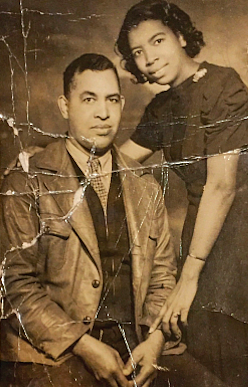Isadore Banks was a 59-year-old African American landowner who disappeared on June 4, 1954. Banks was born on July 15, 1895, in Arkansas. Much of Banks’ early life is unknown, but he joined the United States Army when he was 22 years old during World War I. Banks returned to Arkansas after the war ended and started to work at a utility company. Banks would later become a Freemason and one of Arkansas’s wealthiest African American landowners. It was reported that Banks owned more than 1,000 acres of land and several businesses in Crittenden County, Arkansas.
Banks also helped black farmers with loans to buy seeds and farm equipment and supported the local black school with supplies. On June 4, 1954, Banks’ wife Alice last saw him leave the house with the intention of paying his farmhands. On June 8, 1954, Banks’ truck was discovered in a wooded property just outside of Marion (Crittenden County) by Carl Croom, a neighboring landowner. Banks’ loaded shotgun was also in the truck along with a coat.
Authorities later found Banks’ body tied to a tree, mutilated, and burned beyond recognition. Over the years, there have been many theories about the motive for the murder of this prominent citizen and landowner. One theory suggests that he had refused to sell his land to several white men, who, angered by his repeated refusals, attacked and killed him. A second theory suggests that Banks was renting land from a white woman and may have had a sexual relationship with her, angering local whites who then killed him. The third theory argued that Banks might have been romantically involved with a number of white women in the area and thus was murdered for his relationships. The final theory is that Banks was involved in an altercation with some white men who propositioned his daughter. They then killed him for defending her. Whatever the reason, Banks murder was considered a “lynching” and an act of terror designed to intimidate other Black residents of the community.
Local law enforcement did little to investigate Banks’ murder. The Grant Co-op Gin, run by a group of prominent black citizens of Crittenden County, offered a $1,000 reward to the arrest of the perpetrators involved. No one came forward with any information, and subsequently no arrests were made and no one was punished for the murder. L.C. Bates, a civil rights advocate and head of the Little Rock branch of the NAACP, reached out to help with the investigation but with no results.
Banks’ murder case remains unsolved. Banks was buried in 1954 with military honors for his service in World War I. In 2020, a ten-episode podcast on Banks’ murder called Unfinished: Deep South was released.
Do you find this information helpful? A small donation would help us keep this available to all. Forego a bottle of soda and donate its cost to us for the information you just learned, and feel good about helping to make it available to everyone.
BlackPast.org is a 501(c)(3) non-profit and our EIN is 26-1625373. Your donation is fully tax-deductible.
“Isadore Banks,” Encyclopedia of Arkansas, https://encyclopediaofarkansas.net/entries/isadore-banks-6425/; “Isadore Banks,” PBS, https://www.pbs.org/wgbh/frontline/interactive/unresolved/cases/isadore-banks; “Isadore Banks,” Arkansas Online, https://www.arkansasonline.com/news/2020/jul/28/a-legacy-vanished/.

